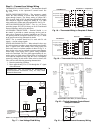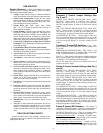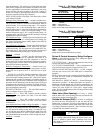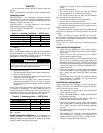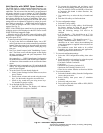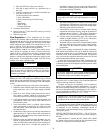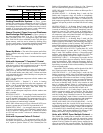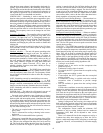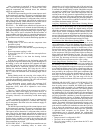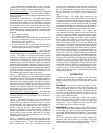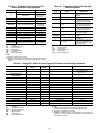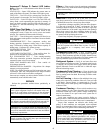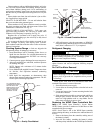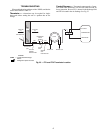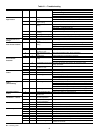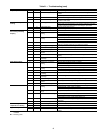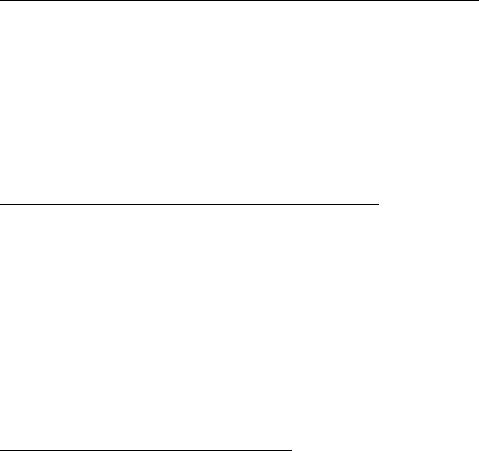
42
After a compressor is staged off, it may be restarted again
after a normal time-guard period of 5 minutes and if the
supply-air temperature has increased above the minimum
supply-air temperature limit.
The WSHP Open controller provides a status input to moni-
tor the compressor operation. The status is monitored to deter-
mine if the compressor status matches the commanded state.
This input is used to determine if a refrigerant safety switch or
other safety device has tripped and caused the compressor to
stop operating normally. If this should occur, an alarm will be
generated to indicate the faulted compressor condition.
HEATING — The WSHP Open controller will operate one or
two stages of compression to maintain the desired heating set
point. The compressor outputs are controlled by the heating PI
(proportional-integral) loop and heating stages capacity algo-
rithm. They will be used to calculate the desired number of
stages needed to satisfy the space by comparing the space tem-
perature (SPT) to the appropriate heating set point. The follow-
ing conditions must be true in order for the heating algorithm to
run:
• Heating is set to Enable.
• Cooling mode is not active and the compressor time
guard has expired.
• Condensate overflow input is normal.
• If occupied, the SPT is less than the occupied heating set
point.
• Space temperature reading is valid.
• If unoccupied, the SPT is less than the unoccupied heat-
ing set point.
• OAT (if available) is less than the heating lockout
temperature.
If all the above conditions are met, the heating outputs will
be energized as required, otherwise they will be deenergized. If
the heating is active and should the SAT approach the maxi-
mum SAT limit, the fan will be indexed to the next higher
speed. Should this be insufficient, and the SAT rises further
reaching the maximum heating SAT limit, the fan will be
indexed to the maximum speed. If the SAT still continues to
rise 5 F above the maximum limit, all heating stages will be
disabled.
During Heating mode, the reversing valve output will be
held in the heating position (either B or O type as configured)
even after the compressor is stopped. The valve will not switch
position until the Cooling mode is required.
The configuration screens contain the maximum SAT
parameter as well as heating lockout based on outdoor-air
temperature (OAT); both can be adjusted to meet various
specifications.
There is a 5-minute off time for the compressor as well as a
5-minute time delay when staging up to allow the SAT to
achieve a stable temperature before energizing a second stage
of capacity. Likewise, a 45-second delay is used when staging
down.
After a compressor is staged off, it may be restarted again
after a normal time-guard period of 5 minutes and if the sup-
ply-air temperature has fallen below the maximum supply air
temperature limit.
The WSHP Open controller provides a status input to moni-
tor the compressor operation. The status is monitored to deter-
mine if the compressor status matches the commanded state.
This input is used to determine if a refrigerant safety switch or
other safety device has tripped and caused the compressor to
stop operating normally. If this should occur, an alarm will be
generated to indicate the faulted compressor condition. Also, if
auxiliary heat is available (see below), the auxiliary heat will
operate to replace the reverse cycle heating and maintain the
space temperature as required.
AUXILIARY HEAT — The WSHP Open controller can con-
trol a two-position, modulating water, or steam valve
connected to a coil on the discharge side of the unit and sup-
plied by a boiler or a single-stage ducted electric heater in order
to maintain the desired heating set point. Should the compres-
sor capacity be insufficient or a compressor failure occurs, the
auxiliary heat will be used. Unless the compressor fails, the
auxiliary heat will only operate to supplement the heat provid-
ed by the compressor if the space temperature falls more than
one degree below the desired heating set point (the amount is
configurable). The heat will be controlled so the SAT will not
exceed the maximum heating SAT limit.
Auxiliary Modulating Hot Water/Steam Heating Reheat
— The control can modulate a hot water or steam valve con-
nected to a coil on the discharge side of the unit and supplied
by a boiler in order to maintain the desired heating set point
should the compressor capacity be insufficient or a compressor
failure occurs. Unless a compressor fault condition exists, the
valve will only operate to supplement heat provided by com-
pressor if the space temperature falls more than one degree be-
low the desired heating set point. The valve will be controlled
so the SAT will not exceed maximum heating SAT limit.
Two-Position Hot Water/Steam Heating Reheat
— The con-
trol can operate a two-position, NO or NC, hot water or steam
valve connected to a coil on the discharge side of the unit and
supplied by a boiler in order to maintain the desired heating set
point should the compressor capacity be insufficient or a com-
pressor failure occurs. Unless a compressor fault condition ex-
ists, the valve will only open to supplement the heat provided
by the compressor if the space temperature falls more than one
degree below the desired heating set point. The valve will be
controlled so the SAT will not exceed the maximum heating
SAT limit. The heat stage will also be subject to a 2-minute
minimum OFF time to prevent excessive valve cycling.
Single Stage Electric Auxiliary Heat
— The control can op-
erate a field-installed single stage of electric heat installed on
the discharge side of the unit in order to maintain the desired
heating set point should the compressor capacity be insufficient
or a compressor failure occurs. Unless a compressor fault con-
dition exists, the heat stage will only operate to supplement the
heat provided by the compressor if the space temperature falls
more than one degree below the desired heating set point. The
heat stage will be controlled so the SAT will not exceed the
maximum heating SAT limit. The heat stage will also be
subject to a 2-minute minimum OFF time to prevent excessive
cycling.
INDOOR AIR QUALITY (IAQ) AND DEMAND CON-
TROLLED VENTILATION (DCV) — If the optional in-
door air quality sensor is installed, the WSHP Open controller
can maintain indoor air quality via a modulating OA damper
providing demand controlled ventilation. The control operates
the modulating OA damper during occupied periods. The con-
trol monitors the CO
2
level and compares it to the configured
set points, adjusting the ventilation rate as required. The control
provides proportional ventilation to meet the requirements of
ASHRAE (American Society of Heating, Refrigerating and
Air Conditioning Engineers) specifications by providing a base
ventilation rate and then increasing the rate as the CO
2
level in-
creases. The control will begin to proportionally increase venti-
lation when the CO
2
level rises above the start ventilation set
point and will reach the full ventilation rate when the CO
2
level
is at or above the maximum set point. A user-configurable
minimum damper position ensures that proper base ventilation
is delivered when occupants are not present. The IAQ
configurations can be accessed through the configuration
screen. The following conditions must be true in order for this
algorithm to run:
• Damper control is configured for DCV.
• The unit is in an occupied mode.
• The IAQ sensor reading is greater than the DCV start
control set point.



